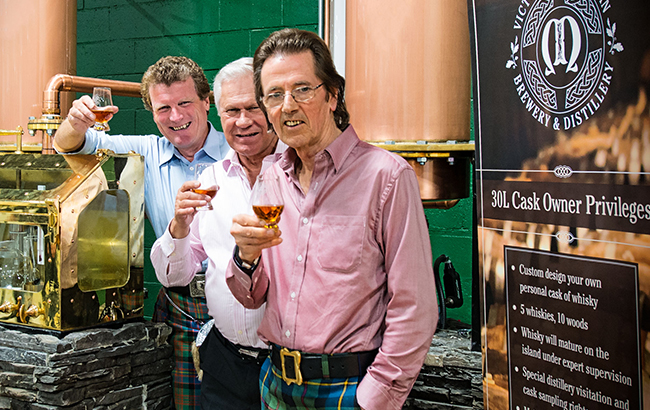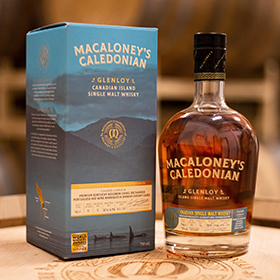SWA sues Canadian distiller over use of ‘Caledonian’
By Nicola CarruthersCanadian whisky maker Macaloney’s Caledonian Distillery has ‘strongly’ opposed a lawsuit from the Scotch Whisky Association over its use of words associated with Scotland, calling it ‘unfair and unwarranted’.

Earlier this month, trade body the Scotch Whisky Association (SWA) filed a civil lawsuit against MacMhaol‐onfhaidh (Macaloney) Brewers & Distillers, the owner of Macaloney’s Caledonian Distillery & Twa Dogs Brewery in British Columbia, Canada.
The SWA has accused the producer of violating Scotch whisky’s geographical indication (GI) by using words that are associated with the country on its whiskies.
The SWA has objected to the use of the words ‘Caledonian’, ‘Macaloney’, ‘Island whisky’, ‘Glenloy’, and ‘Invermallie’ on the distiller’s products.
Founded in late 2016, Macaloney’s Caledonian Distillery produces Canadian single malt and triple-distilled pot still whiskies, made using traditional Scottish and Irish methods.
The distiller said it ‘strongly’ disagreed with the SWA’s lawsuit and claims to have never used the Scotch GI on its products.
The firm called the challenge ‘unfair and unwarranted’ regarding its use of the word ‘island’ as ‘Canada has as many, if not more, island distilleries than Scotland’.
The producer said its whisky team is made up of Scots, including founder Graeme Macaloney; former Diageo master distiller Mike Nicolson, who serves as master distiller; and the late Dr Jim Swan, who acted as a consultant.
The firm also argued that the use of ‘Macaloney’ refers to its founder’s last name.
Caledonia is also important to the brand’s story because of the founder’s heritage and home in British Columbia, which was originally called New Caledonia by settlers in the early 1800s, the distiller said.
Furthermore, the use of ‘Glen’ and ‘Inver’ on some of Macaloney’s whiskies refer to specific valleys where the founder’s ancestors made history.
‘Glen’ is also used by other Canadian craft distillers, including Glenora Distillery’s Glen Breton whisky, which won a lawsuit against the SWA in 2009, the producer noted.

The company said: “We are proud to celebrate our heritage including the Scottish ancestry of our founder and the story of his family, and firmly believe we have the right to do so in a way that celebrates both that history and reputation as a leading Vancouver Island craft distillery.”
Macaloney claimed it contacted the SWA in 2016 to understand their label requirements, and was ‘open and transparent’ regarding the use of ‘Macaloney’ and ‘Caledonian’ on its branding.
At the time, the SWA did not object to the words ‘Macaloney’ and ‘Caledonian’, the distiller said.
In late 2019, the SWA requested that Macaloney stop describing its master distiller as a ‘Scotch master distiller’ and instead use the term ‘Scottish master distiller’.
Macaloney said it had also agreed to prominently display the word ‘Canadian’ on its whiskies.
Furthermore, Macaloney claimed that its products’ labelling and packaging highlight that they are made in Canada and at the distillery in Victoria, British Columbia. A map of Vancouver is also displayed on the label.
The company added: “As we have done from the beginning, we will continue to work with the SWA and its members in a collaborative manner.”
SWA statement
A spokesperson from the SWA said: “The SWA consistently takes action in our global markets to prevent the use of Scottish indications of origin on whisky which is not Scotch whisky.
“This is vital to protecting both Scotland’s national drink and to ensuring that consumers across the world are clear about whether or not they are buying whisky that is produced in Scotland.
“It’s critical to us to ensure that spirits producers in other countries do not take advantage of the quality reputation of Scotch whisky that our industry has built up over decades.
“It is important that anyone who wants to purchase a bottle of Scotch whisky can do so with the confidence that what they are buying is authentic, and that products which aren’t Scotch whisky are clearly differentiated.
“In this instance, we have objected to the company’s use of certain words and terms that are strongly associated with Scotland on their whisky products.
“We never take legal proceedings lightly, and the SWA is always open to a resolution which protects both the Scotch whisky trade and consumers without the need for additional legal action.”
In August 2019, the Virginia Distillery Company removed the word ‘Highland’ from its products after reaching an “amicable resolution” in its lawsuit with the SWA.
